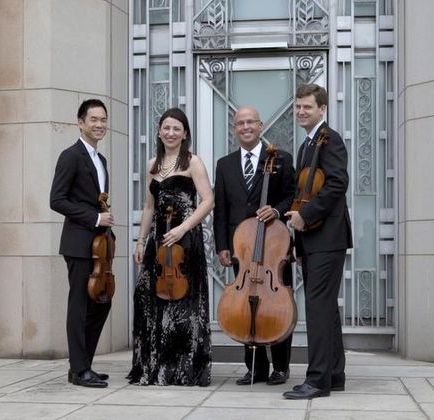Ehnes Quartet opens FOCM season with drama and precision

The Ehnes Quartet opened the season for Friends of Chamber Music Monday night at Coral Gables Congregational Church.
The Ehnes Quartet, which performed Monday night in Coral Gables, is an unusual group.
Ignoring the egalitarianism that prevails in contemporary chamber ensembles, the quartet is named for its first violinist, the star concert soloist James Ehnes. And in a chamber music world dominated by full-time groups, this one is something of an avocation for its members, all of whom have busy musical careers.
But as their performances of Schubert and Brahms showed, their tonal warmth, ensemble cohesion and interpretive intelligence places the Ehnes Quartet with the world’s leading chamber groups. They opened this season’s Friends of Chamber Music of Miami series in the colonnaded hall of Coral Gables Congregational Church.
In their hands, the plaintive opening theme of Schubert’s String Quartet No. 13, known as the “Rosamunde” quartet, had a vocal quality reminiscent of the composer’s bleaker songs. Ehnes, who has a shining tone when he wants to use it, played in a restrained but smooth manner, phrasing the melody in a way that brought out its wistfulness without slathering it with vibrato. Second violinist Amy Schwartz Moretti effectively accompanied him with one of those rustling figures that give so many of Schubert’s melodies their character.
As the lyricism diminished and the drama increased, the musicians brought a tight precision and vigorous energy to the performance, playing contrapuntal passages with a stern rigor that contrasted effectively with the dreamy melancholy.
The middle movements, the first of which contains a melody Schubert composed for the play “Rosamunde,” came off with a graceful, Viennese nostalgia. Cellist Robert DeMaine, whose day job is principal cellist of the Los Angeles Philharmonic, played in an assertive, elegant and penetrating manner in the bursts of melody that came his way.
There was a crispness and finesse to the manner with which they dispatched the minor-key melody of the final movement. Both violinists played in the rapid passages with which it abounded in sparkling style. Violist Richard O’Neill, however, held back too much, playing too softly when he took on the occasional exposed passage.
Joining the quartet for a performance of the Brahms String Quintet No. 2 was the violist Michael Tree, who had been a member of the now-disbanded Guarneri Quartet, the leading quartet of the late 20th century.
Brahms did not often express unbridled joy in his music, but one example is the opening of this quintet. Under a shimmering accompaniment in the other instruments, cellist DeMaine gave an intense, forward-leaning but never distorted account of the jubilant opening theme. As the movement went from climax to climax, the ensemble achieved a rich, symphonic tone, with Ehnes’ gleaming violin sound at the top. Here violist O’Neill showed himself capable of richly toned, deeply expressive playing.
Performances of Brahms chamber music can sometimes become heavy and even ponderous, but such was not the case with the Ehnes Quartet. As complex as the music became, they kept it moving, restless and searching in the slow second movement, urgent and driving in the third. And in the interludes of lyricism that permeate the work, they took the time to play with a relaxed warmth, luxuriating in the tonal richness of the composer’s world. The last movement had a manic, Hungarian-inflected quality, inspiring the musicians to play in an edge-of-the-seat style that brought the quintet to a spirited conclusion.
Posted in Performances
One Response to “Ehnes Quartet opens FOCM season with drama and precision”
Leave a Comment
Tue Oct 28, 2014
at 11:17 am
1 Comment







Posted Oct 31, 2014 at 11:13 am by Margo C. Lazzerini
I wish I had known of the performance. I would have loved to be there.